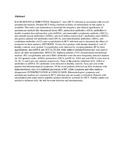| dc.description.abstract | BACKGROUND & OBJECTIVES: Hepatitis C virus (HCV) infection is associated with several autoimmune markers. Despite HCV being common in India, no information on this aspect is available. This study was undertaken to ascertain the frequency and clinical significance of autoimmune markers like rheumatoid factor (RF), antinuclear antibodies (ANA), antibodies to double stranded deoxyribonucleic acid (dsDNA), anti neutrophil cytoplasmic antibody (ANCA), anti smooth muscle antibodies (ASMA), anti liver kidney microsomal 1 antibodies (anti LKM1), anti gastric parietal cell antibodies (anti GPCA), anti mitochondrial antibodies (AMA), anti cardiolipin antibodies (ACL) and cryoglobulins in HCV infection and to determine the effect of treatment on these markers. METHODS: Twenty five patients with chronic hepatitis C and 25 healthy controls were studied. Cryoglobulins were detected by cryoprecipitation, RF by latex agglutination, anti dsDNA and ACL by ELISA while indirect immunofluorescence was used to detect all other autoantibodies. RESULTS: Eighteen patients (72%) demonstrated autoimmune markers. RF, cryoglobulins and anti LKM1 antibodies were the most frequently detected markers (in 32% patients each). ASMA, perinuclear ANCA (pANCA), ANA and anti GPCA were seen in 24, 20, 12 and 4 per cent patients respectively. None of the patients exhibited ACL, AMA or antibodies to dsDNA. No antibodies were detected in healthy controls. Sixty per cent of the patients had rheumatological symptoms. Of the seven patients followed up after treatment with alpha interferon, only two exhibited persistence of RF, while symptoms and other markers disappeared. INTERPRETATION & CONCLUSION: Rheumatological symptoms and autoimmune markers are common in HCV infection and are usually overlooked. Patients with unexplained joint pains and/or palpable purpura should be screened for HCV. Further studies are needed to delineate fully the link between infection and autoimmunity. | en |

